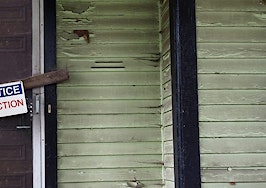When they aren’t marketing $45 million properties, agents are often tasked with selling homes on the foreclosure market, which in July included nearly 365,000 properties. Homes that have been foreclosed, seized or otherwise abandoned come with their own set of challenges, be it vandalism or squatters.
Earlier this month, a Realtor in Alabama was nearly arrested after being mistaken for a burglar when she entered a recently foreclosed home for a showing. Because the house had been broken into several times before, a neighbor thought Century 21 Regency Realty Realtor Cheryl Piccinini was breaking and entering — and promptly called the police.

Courtesy of Cheryl Piccinini
According to Piccinini, the situation left her stupefied — she wasn’t sure what to do when she came for a showing and found the real-estate lock box missing. She later realized that opening the door may not have been the best choice.
While the police showed up and accepted her business card, Piccinini later realized that she narrowly missed a dangerous situation — one that could put an agent at serious risk of violence or even arrest.
“Foreclosures are an imminent threat to our safety,” Piccinini told Inman. “They are obviously vacant and have been for a while, which potentially draws the attention of criminals, vagrants, and/or drug addicts. I had no idea that I was about to walk into a dangerous situation.”
To avoid danger, we’ve compiled a list of safety tips to help navigate the sale of homes seized by the bank, abandoned or otherwise left vacant.
“Agents must know to be cautious and to expect anything when showing a foreclosure or bank sale,” said Audrey Porter Plummer of Coldwell Banker.
Find all available information about the property
While this is a good strategy for any home you’re selling, foreclosed properties require an extra level of vigilance, says short-sale Realtor, distressed property expert and Inman contributor Tracey Royce.
“Try to look back through the history of the property through the MLS or anything else that’s publicly available,” Royce said, adding that this could include everything from a decayed plumbing system to a history of crime around the house. As this information is not always provided for bank-owned properties, Royce encourages agents to look through county records for anything that could come up about the house.
Once reviewed, agents should also encourage clients who are considering buying a foreclosed property to pay for an extra inspection of the home.
Try to contact the listings agent
We won’t lie: doing so can be difficult. Listings agents who specialize in foreclosed bank-sale properties often deal with high volumes of houses and simply don’t have the time to respond to agent questions, Royce said.
Still, making that call or sending that email should still be one of your first steps.
“It can be a lot more difficult to have a listings conversation with an REO listings agent than with a traditional agent, but you still need to do your due diligence,” Royce said.
Use the ‘buddy system’ when showing alone
Properties that have been left vacant for a significant period of time often attract vagrants or, in some cases, kids looking to party. To avoid situations in which agents enter a home and find somebody inside, they should always let a colleague know when they check in and when they check out.
Other precautions can include announcing yourself as soon as you enter the property and staying on the phone with a colleague if you suspect that someone else is inside.
Never enter a home if you do not have a scheduled showing
While it can be difficult to contact a listing agent when you have a showing and are in front of a house, you should never enter a property if you find the door broken, cannot find the lockbox or otherwise have to do something outside of what has been arranged. Doing so can cause serious problems.
“If I am unable to reach anyone for scheduling an appointment I am obviously NOT showing the property,” Plummer said.
Fight for a lower price
When agents are not able to get accurate information about a house, they should warn their clients about the dangers of buying a foreclosed property — and enourage them to buy at a discount so that they can leave enough of a gap for potential repairs and problems down the line.
“Try to piece together as much of an idea of what’s been done or not done to the house as possible,” Royce said. “If that’s not possible, I would advise the buyers to buy at heavy enough of a discount so that there’s a budget for anything that comes up.”













